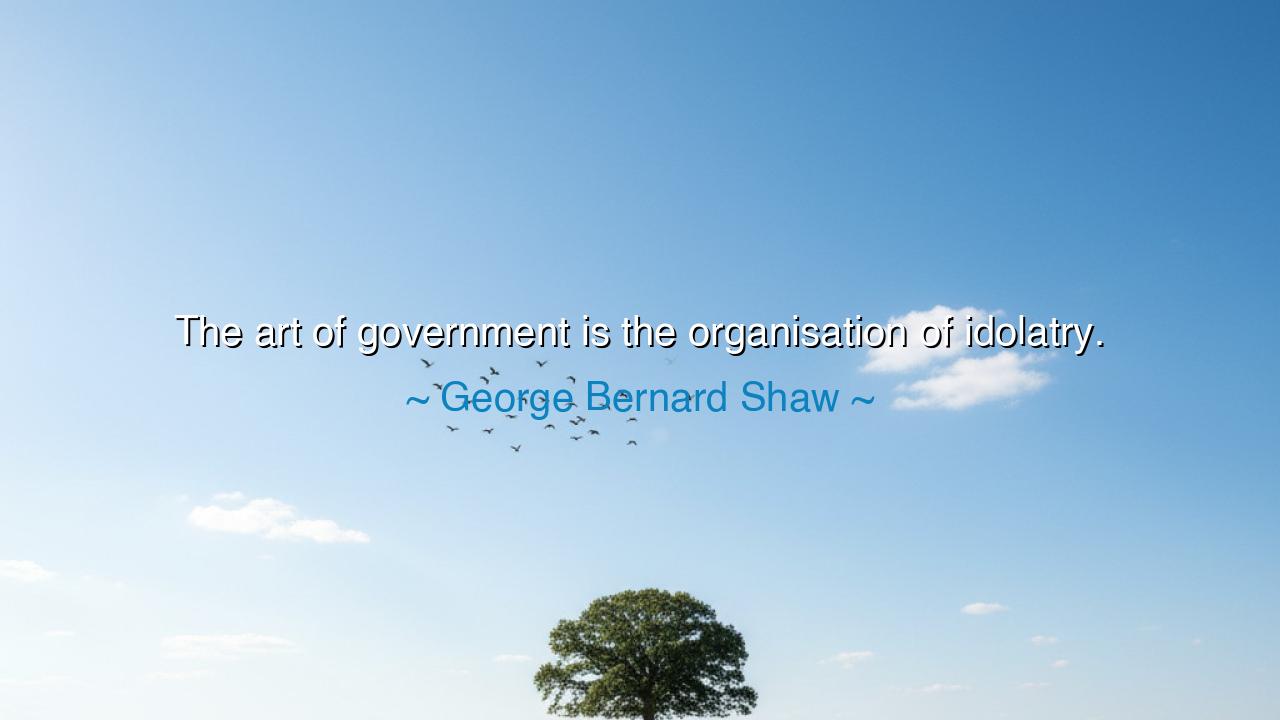
The art of government is the organisation of idolatry.






The words of George Bernard Shaw, ever sharp, ever subversive, strike like lightning through the illusions of power: “The art of government is the organisation of idolatry.” In this piercing observation, Shaw does not simply mock politics—he unmasks its most enduring deception. He reminds us that the state, though built by men, often survives by myth. The rulers, the systems, and even the flags that flutter above nations derive much of their strength not from reason or justice, but from belief—from the people’s willingness to worship authority as if it were divine. Government, Shaw suggests, is not sustained by logic alone, but by the human need to bow before something greater than itself, even when that greatness is imagined.
At its heart, this quote reveals the psychological nature of power. Shaw calls government an “art,” for it is indeed a craft—a deliberate shaping of perception. Every society, he implies, is bound together not merely by laws, but by symbols: crowns, anthems, flags, heroes, and sacred texts. These are the idols of the modern age. They transform fallible leaders into legends, policies into moral duties, and nations into holy causes. Thus, the “organisation of idolatry” is not blasphemy but strategy—it is how rulers turn obedience into faith. When people believe that loyalty to the state is virtue, and questioning it is treason, then the government has mastered the art of ruling hearts as well as minds.
The origin of Shaw’s insight lies in his lifelong skepticism of institutions that claim moral supremacy. As a playwright, critic, and philosopher of the early 20th century, Shaw witnessed the rise of nationalism, the decay of monarchies, and the seductive power of propaganda. In his works—such as Man and Superman and Major Barbara—he dissected the illusions that sustain society: religion, war, wealth, and politics. He saw that governments, regardless of ideology—monarchic, democratic, socialist, or capitalist—all relied upon one ancient trick: the manufacture of reverence. The statesman, the general, and the priest were united in their ability to sanctify power, to make men die for ideas they scarcely understood. Shaw’s statement, then, was not a condemnation of governance itself, but of blind reverence—the transformation of authority into an idol that demands devotion without question.
History is filled with examples that prove Shaw’s words. Consider the rise of Nazi Germany, where a nation of thinkers and artisans was led into moral darkness not merely by force, but by faith. Adolf Hitler mastered the “art of government” by turning politics into religion—with himself as prophet and the state as god. The swastika became a sacred symbol; the Führer’s words, scripture. Millions obeyed not out of fear alone, but from worship—an idolatry so complete that it consumed truth, compassion, and conscience alike. The same pattern, in milder forms, appears across ages: in the divine kings of Egypt, in the emperors of Rome, in the cult of personality that shadows even modern democracies. Every ruler who seeks to be loved more than questioned partakes in this ancient art—the crafting of idols from human vanity.
Yet Shaw’s insight, though cynical, is not without hope. He challenges us to awaken—to see through the veil of sanctified authority and reclaim our moral independence. Governments must exist, but they must not be worshiped. Power must be respected, but never adored. To practice democracy in its truest form is to remember that leaders are not gods, but servants, and that patriotism without conscience is but another form of idolatry. When citizens stop kneeling before power and start holding it accountable, the idol shatters, and in its place arises something nobler: a government of free minds, not bound hearts.
There is a quiet heroism in those who have resisted this idolatry. Think of Socrates, who defied the laws of Athens when they commanded him to betray truth. Think of Vaclav Havel, who, under communist rule, refused to worship the machinery of the state and instead called for “living in truth.” These men stood against the false gods of their age—not with swords, but with integrity. Their defiance proves that the most sacred act a citizen can perform is not blind obedience, but moral discernment. To think freely, to question authority, and to act with conscience—these are the rituals of true civic faith.
The lesson, therefore, is as old as civilization itself: beware of worshiping power, in whatever form it takes. The idol may wear a crown, or carry a flag, or promise equality—but its hunger is always the same. When love for one’s nation turns into worship of its leaders, when loyalty silences truth, when pride blinds justice, then the people have built their own golden calf. Let governments serve, but let men remain free. Let citizens honor their institutions, but let them also demand their humility.
So let Shaw’s words echo like a warning across the centuries: the art of government must never become the art of deception. Remember that true greatness in leadership does not demand idolatry—it invites accountability. A wise people will respect their rulers, but never worship them; obey laws, but never surrender their conscience; love their country, but never at the cost of truth. For the moment the citizen kneels, the republic dies—and in its place stands only an idol carved from the broken fragments of freedom.






AAdministratorAdministrator
Welcome, honored guests. Please leave a comment, we will respond soon